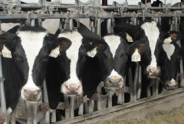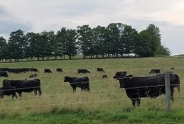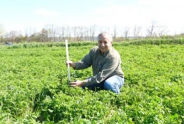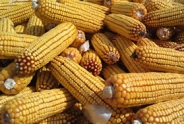Transition Cow Tuesdays
Event Details
Date
November 2, 2021
November 9, 2021
November 16, 2021
November 23, 2021
November 30, 2021
December 7, 2021
December 14, 2021
Time
12:30pm - 1pm
Location
Zoom
Host
PRO-DAIRY
Kathy Barrett
email Kathy Barrett
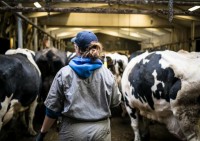
Have you…
- been working with the farm transition cow program but want to know more about the how, what and why?
- wanted to improve the transition cow performance of your herd but need to know where to start?
- wanted to increase the skills you bring to the farm or your farm employer?
- been wondering where you'll find the time to attend a course or workshop?
If so, this webinar series is designed for you! The webinars are short, to the point, and just 30 minutes. Grab your lunch and join us. Generous sponsors have enabled us to offer this series free of charge. Registration is required. One registration provides access to all the webinars in the series. Visit their website for more information.
Topics include:
- Transition Cow Nutrition
- Feeding the Transition Cow
- Selective Dry Cow Therapy
- Facility Considerations
- Calving Considerations
- Post Calving Monitoring
- Evaluating Transition Management
If you are sponsoring this event, send your slide to cnydlfc@cornell.edu
Upcoming Events
Swine Production Zoom Series
February 5, 2026
February 19, 2026
March 5, 2026
March 19, 2026
April 2, 2026
Register for the whole series or for one or several sessions.
Announcements
Statewide Field Crop Pathology Needs Assessment Survey
Your input is wanted for identifying priorities!Please take a moment to fill out this brief and anonymous survey that will guide the Field Crops Pathology Research and Extension program.
Sign Up for Our Weekly E-Newsletter
We send out a bi-weekly e-newsletter that has announcements, upcoming programs, and opportunities for you! Registration is quick, easy, and free. Click here to sign up today!Farmers Can Join MeatSuite For Free!
MeatSuite.com is a free resource provided by Cornell University where NY meat farmers can create a farm profile and list their bulk (wholes, halves, quarters) and bundled (i.e. Grilling Bundle) meat products.Why should farmers join?
1. It's free and easy!
2. Connect with more local customers. In the past year the MeatSuite.com farm directory had 8,300 visits from New York consumers. Farm profiles get as many as 25 views per month from potential local customers. We also spotlight MeatSuite farms on social media and bring attention and purchases to farms through highlights and giveaways.
How do I join?
Farmers can visit https://www.meatsuite.com/farmers/ to create a free farm profile. You must list at least one product for your farm's profile to go live. You'll also have access to Cornell's free Meat Price Calculator, a helpful tool for pricing your meat to make a profit.
While you're on MeatSuite, check out the "Creating Consumer-Friendly Bulk Meats" publication on the log-in page. It has tips on how to create bulk meat products that are easier for first-time buyers to say "yes" to.
If you have any questions as you create your farm profile or products, we're here to help! Please email Matt LeRoux at mnl28@cornell.edu.

